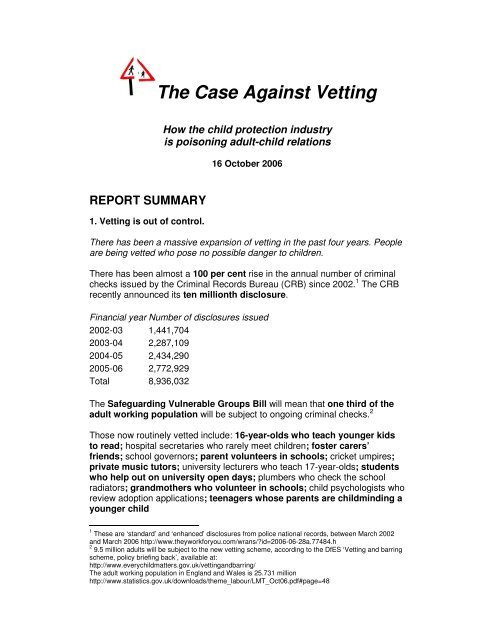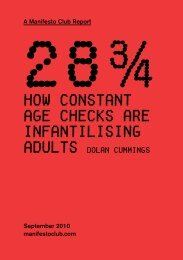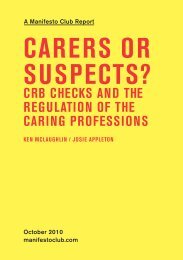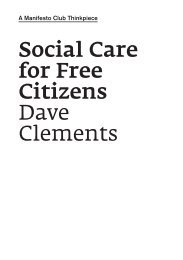The Case Against Vetting - Manifesto Club
The Case Against Vetting - Manifesto Club
The Case Against Vetting - Manifesto Club
Create successful ePaper yourself
Turn your PDF publications into a flip-book with our unique Google optimized e-Paper software.
<strong>The</strong> <strong>Case</strong> <strong>Against</strong> <strong>Vetting</strong><br />
How the child protection industry<br />
is poisoning adult-child relations<br />
16 October 2006<br />
REPORT SUMMARY<br />
1. <strong>Vetting</strong> is out of control.<br />
<strong>The</strong>re has been a massive expansion of vetting in the past four years. People<br />
are being vetted who pose no possible danger to children.<br />
<strong>The</strong>re has been almost a 100 per cent rise in the annual number of criminal<br />
checks issued by the Criminal Records Bureau (CRB) since 2002. 1 <strong>The</strong> CRB<br />
recently announced its ten millionth disclosure.<br />
Financial year Number of disclosures issued<br />
2002-03 1,441,704<br />
2003-04 2,287,109<br />
2004-05 2,434,290<br />
2005-06 2,772,929<br />
Total 8,936,032<br />
<strong>The</strong> Safeguarding Vulnerable Groups Bill will mean that one third of the<br />
adult working population will be subject to ongoing criminal checks. 2<br />
Those now routinely vetted include: 16-year-olds who teach younger kids<br />
to read; hospital secretaries who rarely meet children; foster carers’<br />
friends; school governors; parent volunteers in schools; cricket umpires;<br />
private music tutors; university lecturers who teach 17-year-olds; students<br />
who help out on university open days; plumbers who check the school<br />
radiators; grandmothers who volunteer in schools; child psychologists who<br />
review adoption applications; teenagers whose parents are childminding a<br />
younger child<br />
1 <strong>The</strong>se are ‘standard’ and ‘enhanced’ disclosures from police national records, between March 2002<br />
and March 2006 http://www.theyworkforyou.com/wrans/?id=2006-06-28a.77484.h<br />
2 9.5 million adults will be subject to the new vetting scheme, according to the DfES ‘<strong>Vetting</strong> and barring<br />
scheme, policy briefing back’, available at:<br />
http://www.everychildmatters.gov.uk/vettingandbarring/<br />
<strong>The</strong> adult working population in England and Wales is 25.731 million<br />
http://www.statistics.gov.uk/downloads/theme_labour/LMT_Oct06.pdf#page=48
Running an after-school club is now subject to more stringent tests than<br />
selling explosives, or practising law. 3<br />
2. <strong>Vetting</strong> is damaging community life.<br />
<strong>The</strong> expansion of vetting is threatening the jumble sales, local football teams,<br />
school trips and sports days that are key to children’s lives.<br />
<strong>Vetting</strong> makes it difficult to help the community – in order to give an hour<br />
or two helping out at a school disco, an adult would have to produce three<br />
forms of identification, pay £36, and wait for around four weeks.<br />
Schools have suffered from a dearth of parent volunteers – at sports<br />
days, jumble sales or fetes – because schools were insisting that parents<br />
were CRB checked. Volunteers have been turned away because their<br />
criminal records checks hadn’t come through in time.<br />
Tennis coach and sports promoter, Dan Travis: ‘<strong>Vetting</strong> is helping to<br />
destroy the voluntary sector in sport. Four individuals I have worked with in<br />
the past year did not start their sport or music clubs because they thought that<br />
they were not “allowed” to do so. Fathers will not work with football teams in<br />
which their sons play because they don’t want to come across as “dodgy”.’<br />
Events for children have been cancelled because of vetting. Scottish<br />
Borders Council cancelled foreign exchange visits for children, because the<br />
foreign host families could not be checked. 4<br />
<strong>Vetting</strong> teaches children to be suspicious of all adults, and<br />
bureaucratises informal relationships.<br />
Jim Campbell, Mayor of Oxford: ‘<strong>The</strong> important informal ways in which<br />
people relate are going to disappear – everything will be done under contract.<br />
We are in danger of creating a generation of children who are encouraged to<br />
look at people who want to help them with suspicion.’<br />
3. <strong>Vetting</strong> doesn’t work.<br />
It is unlikely that vetting would have caught Ian Huntley – he didn’t work at the<br />
school of Holly Wells and Jessica Chapman. <strong>Vetting</strong> won’t stop child abusers,<br />
and it may even make them harder to detect.<br />
<strong>Vetting</strong> casts such a wide net that it becomes more difficult to<br />
distinguish between trustworthy and untrustworthy adults.<br />
3 Disclosure Scotland states that standard disclosure is available for senior bank managers and in the<br />
interests of national security, and those applying for explosives licences, but says that those who are<br />
involved in caring for children can get higher-level enhanced disclosures<br />
http://www.disclosurescotland.co.uk/typesofdis.htm<br />
4 Report made to SPTC<br />
1
Simon Wessely, psychiatrist, King’s College London: ‘People are blasé<br />
about vetting, and as a result they are much less likely to spot somebody who<br />
really is a danger. <strong>Vetting</strong> isn’t based on any risk assessment. It is all part of<br />
fear of things that are largely illusory, forgetting fears that are more real.’<br />
Judith Gillespie, Scottish Parent Teacher Council: ‘<strong>The</strong>re is a danger we<br />
will de-skill children, and leave them unable to look out for their own safety<br />
and incapable of judging between risky and safe adults.’<br />
<strong>Vetting</strong> is more about people covering their backs, showing that they<br />
followed the correct procedure and are not to blame if something goes wrong.<br />
Eileen Munro, LSE: ‘This is blame avoidance rather than child<br />
protection. People prefer a mechanical process like a CRB check because<br />
there is no judgment involved and so no risk of making a mistake for which<br />
they might be blamed…. However, if you are trying to help children, you need<br />
to be sensitive to the unique situation of the child.’<br />
4. A child protection industry is making money out of vetting.<br />
<strong>Vetting</strong> places a financial burden on small organisations and volunteers,<br />
channelling away money that could be spent on their work.<br />
• Many volunteers have to pay for themselves to be checked, which<br />
costs between £7 and £30 in administration charges. Employers pay<br />
the CRB either £31 or £36 for a disclosure 5 , and it costs £45 or more<br />
to go through an umbrella body.<br />
• Volunteer Reading Help spends £4300 vetting its 120 staff; 2000<br />
volunteers pay for themselves to be vetted, totalling at least £14,000 –<br />
which all adds up to £18,300. 6<br />
• <strong>The</strong> Scout Association carries out 50,000 checks a year, at a total<br />
cost of £250,000. 7<br />
But it feeds an ever-growing child-protection industry.<br />
• <strong>The</strong> CRB’s disclosure process cost around £83 million for 2005-6, with<br />
government contributing £7 million. 8 <strong>The</strong> CRB’s deal with Capita was<br />
worth around £400 million, over 10 years. 9<br />
• <strong>The</strong> new vetting and barring scheme will have additional set-up costs<br />
of £16.6 million, and annual running costs of between £12 million and<br />
£15 million. 10<br />
5 <strong>The</strong> prices are for standard and enhanced disclosures, respectively<br />
6 Research on the cost of vetting to voluntary bodies, Sadhavi Sharma<br />
7 Research on the cost of vetting to voluntary bodies, Sadhavi Sharma<br />
8 Safeguarding Vulnerable Groups Research Paper, p40<br />
http://www.parliament.uk/commons/lib/research/rp2006/rp06-035.pdf<br />
9 <strong>The</strong> Times, 22 May 2006<br />
10 Safeguarding Vulnerable Groups Research Paper, p40<br />
http://www.parliament.uk/commons/lib/research/rp2006/rp06-035.pdf<br />
2





